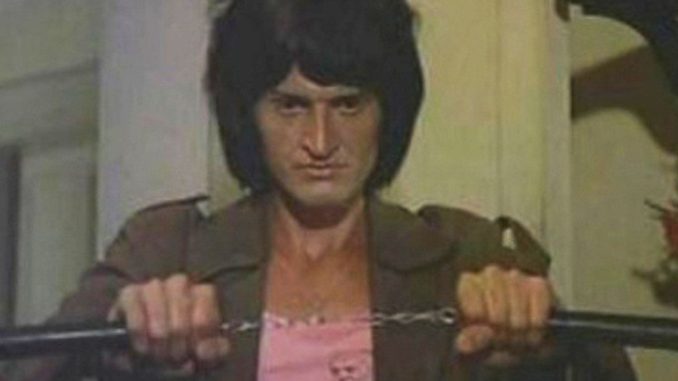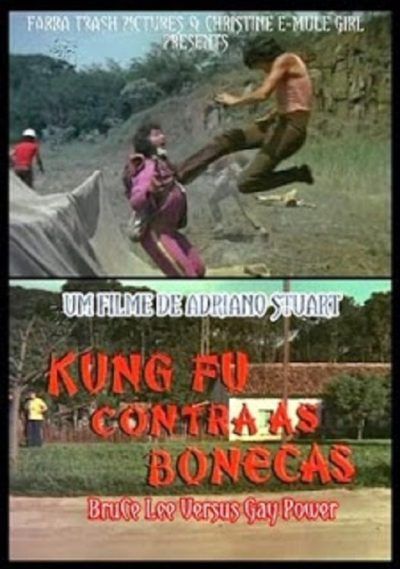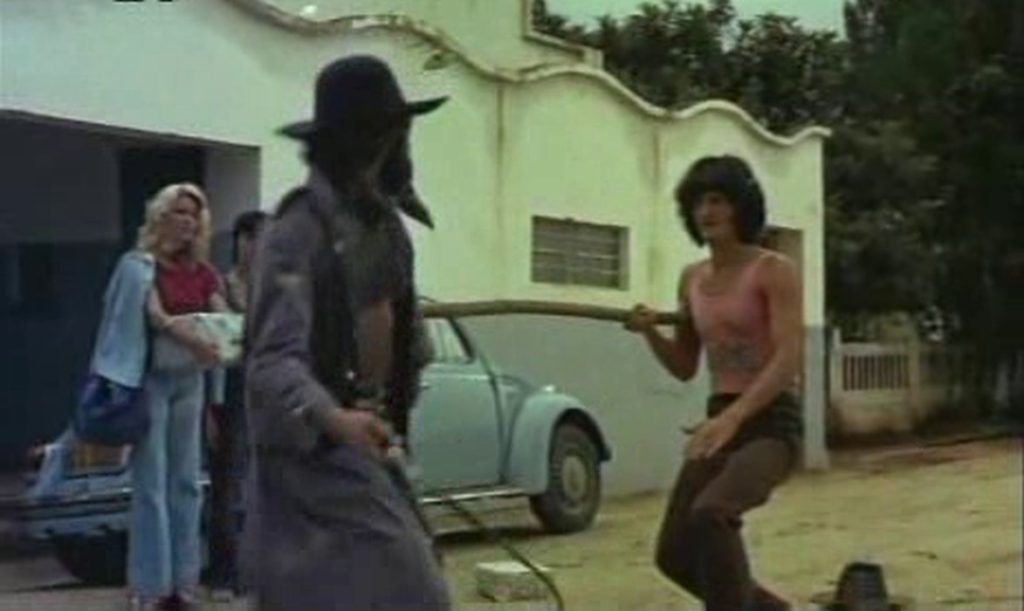
Rating: C
Dir: Adriano Stuart
Star: Adriano Stuart, Mauricio do Valle, Helena Ramos, Célia Froes
a.k.a. Kung Fu Contra as Bonecas
This film first came to attention outside its native Brazil in an off-hand mention of its attention-grabbing title, within Pete Tombs’s 1998 volume on cult cinema around the world, Mondo Macabro. It remained largely unseen until 2008, when a copy recorded off Brazillian cable television began to circulate, albeit without subs. The best chunk of a further decade then passed before that shortcoming was corrected, and non-Portuguese speakers could appreciate the film. Well, “appreciate” might be the wrong word, not least because just about every word of the title is incorrect. It’s also not very good to Northern Hemisphere eyes. I’d say it’s the kind of film which may be more entertaining to write about than watch.
That’s partly because I ended up learning about both the history of cinema in Brazil, and of the country in general. In 1968, a law was passed which meant cinemas were obliged to show a certain percentage of locally-made movies, and this led to a mini-boom in low-budget films to meet the demand. As with American B-movies, genre fare was the order of the day, with horror, sex comedies and action especially prevalent. Another popular local genre was the cangaceiro movie. These were about bandits in the North-east of the country, who were glamourized as heroic, Robin Hood-like characters fighting the evil land barons of the time. This matters, because the movie here is a spoof of both martial arts films and cangaceiro ones.
 Despite the title, it has nothing to do with Bruce Lee, and his opponents are not homosexual either. As the original name suggests, this is much more inspired by the David Carradine series of the early seventies. Bonecas is literally “dolls” in Portuguese, and while it’s slang for gays, it seems to refer to the fairly flamboyant dressing style of the cangaceiros here. This is legit: per Wikipedia, they “preferred to wear leather clothing, embellished with all kinds of coloured ribbons and metal pieces. They also used leather gloves with coins and other pieces of metal sewn onto them, almost like armour but with decorative purposes. Because of the heat and the absence of water some cangaceiros wore French perfume.” On that basis, “dolls” is hardly a stretch.
Despite the title, it has nothing to do with Bruce Lee, and his opponents are not homosexual either. As the original name suggests, this is much more inspired by the David Carradine series of the early seventies. Bonecas is literally “dolls” in Portuguese, and while it’s slang for gays, it seems to refer to the fairly flamboyant dressing style of the cangaceiros here. This is legit: per Wikipedia, they “preferred to wear leather clothing, embellished with all kinds of coloured ribbons and metal pieces. They also used leather gloves with coins and other pieces of metal sewn onto them, almost like armour but with decorative purposes. Because of the heat and the absence of water some cangaceiros wore French perfume.” On that basis, “dolls” is hardly a stretch.
The hero is Chang (Stuart), a wandering martial-arts expert in a wide-brimmed hat, who carries a musical instrument as he wanders the land. And, just in case you missed the inspiration, he wears a pink T-shirt with an image of David Carradine and KUNG FU written on it. Subtlety is not this movie’s strong point. He wanders into a situation where the local band of cangaceiros, under Big Blue (do Valle, who appeared in more serious films about them as well), have gone against type and teamed up with a landlord, to force the locals into complying with his development plans. In particular, he rescues Maria (Ramos) from Blue’s thugs. The two begin their campaign against Big Blue, for it turns out Maria knows a thing or two about self-defense herself.
From an contemporary, Anglocentric viewpoint, this is clearly problematic viewing. There’s no frame of reference for half the humour here, as we have never seen any cangaceiro films. It’s like a Pakistani in 2057 trying to make sense of something like Epic Movie. This isn’t the film’s fault, and in fairness, all I can do is kinda ignore those elements. It also seems loaded with football jokes: Big Blue’s men have numbers on their jerseys, and engage in what feels close to fan chants, e.g. “It’s the number 10 shirt of the team”. At one point, after Chang beats one up, he turns the unconscious man over, to see a “2” on his shirt and proclaims, “I always hated right backs.” I genuinely LOL’d – a more glorious combo of football and the seventies, is hard to imagine. There are other references, such as a group showing up waving the flag of the Corinthians team from Sao Paolo. Again: what this means, I’ve no idea.
 The problem can be more easily identified on the martial arts comedy side, too much of which simply isn’t funny. The makers seem to think that copying the elements of Kung Fu and twisting them a bit, is sufficient to create comedy gold. It isn’t. You see one flashback to Chang studying under some Brazillian guy, pretending to be Chinese, yet wearing blackface… you’ve seen them all. I was at least slightly taken by him having a fun-sized saxophone, instead of the flute Carradine carried.
The problem can be more easily identified on the martial arts comedy side, too much of which simply isn’t funny. The makers seem to think that copying the elements of Kung Fu and twisting them a bit, is sufficient to create comedy gold. It isn’t. You see one flashback to Chang studying under some Brazillian guy, pretending to be Chinese, yet wearing blackface… you’ve seen them all. I was at least slightly taken by him having a fun-sized saxophone, instead of the flute Carradine carried.
It doesn’t help the action sequences are terrible, and certainly outlive their entertainment level. Frankly, Maria might be better than Chang; she’s certainly more enthusiastic, though his ability to pull nunchakus out of thin air provoked slight amusement. Capoeira, the main school on view here, simply isn’t very cinematic: people doing cartwheels somewhere near-ish each other, is not exactly Bruce-worthy. Perhaps the funniest thing about the title is, if anything, Chang arguably demonstrates a greater quantity of gayness than his opponents. Though he does end up in bed with Maria, he is considerably more interested in noodling with his mini-sax. Then there’s the ending, which sees him wander off into the sunset, hand-in-hand with the transvestite waiter from the local whorehouse, whom he enthusiastically spanked in an earlier scene. This is something I’m fairly sure never happened to Carradine or Lee.
It all feels like one of those cases where the title was made up by someone trying to sell dodgy bootlegs, and the reality is only ever going to disappoint in comparison. Truth be told, the major barrier to this being released now is less political correctness, and more likely a cease and desist from Warner Bros. Television. On the other hand, I’ve seen considerably worse, when it comes to low-budget Brazillian cinema. I suspect this would play considerably better, if I was a local viewer, watching it at the time of its original release. The film was never intended for an overseas audience, and I can hardly blame it for any failings which may result.
